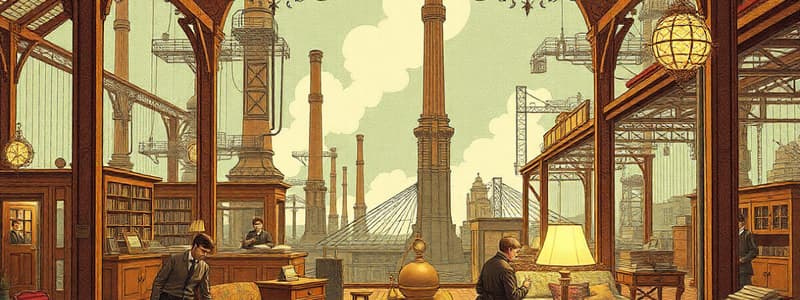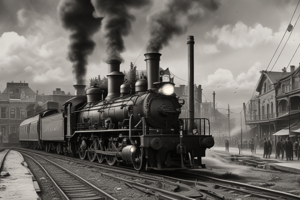Podcast
Questions and Answers
What was a significant effect of the Bessemer steel process during the Second Industrial Revolution?
What was a significant effect of the Bessemer steel process during the Second Industrial Revolution?
- It helped mechanize manufacturing processes. (correct)
- It created a new market for agricultural products.
- It increased the demand for manual labor.
- It decreased the production costs of coal mining.
How did scientific management impact laborers during the Second Industrial Revolution?
How did scientific management impact laborers during the Second Industrial Revolution?
- It focused on creating safer working environments.
- It increased output but dehumanized workers. (correct)
- It resulted in higher wages for all laborers.
- It improved job satisfaction and worker morale.
Which method did corporations ideally use to achieve a monopoly in the market?
Which method did corporations ideally use to achieve a monopoly in the market?
- Innovation in product design.
- Vertical integration. (correct)
- Horizontal integration. (correct)
- Government regulation.
What was one consequence of the lack of government regulations during the Second Industrial Revolution?
What was one consequence of the lack of government regulations during the Second Industrial Revolution?
What characterizes the working conditions for men employed in factories during this period?
What characterizes the working conditions for men employed in factories during this period?
What was a major tragedy that influenced fire safety regulations?
What was a major tragedy that influenced fire safety regulations?
What term describes the socio-political policy that favored established inhabitants over immigrants?
What term describes the socio-political policy that favored established inhabitants over immigrants?
Which immigrant groups faced increased prejudice during the Industrial Revolution?
Which immigrant groups faced increased prejudice during the Industrial Revolution?
Which of the following was a demographic change in the workforce during the Second Industrial Revolution?
Which of the following was a demographic change in the workforce during the Second Industrial Revolution?
What was a primary factor contributing to the high workplace accident rates during the Second Industrial Revolution?
What was a primary factor contributing to the high workplace accident rates during the Second Industrial Revolution?
What was one of the main purposes of the Page Act of 1875?
What was one of the main purposes of the Page Act of 1875?
How did muckrakers contribute to urban improvement during the Industrial Age?
How did muckrakers contribute to urban improvement during the Industrial Age?
Which of the following best describes Social Darwinism?
Which of the following best describes Social Darwinism?
What was a significant outcome of the Spanish-American War for the United States?
What was a significant outcome of the Spanish-American War for the United States?
What were the main health challenges faced by soldiers during the Spanish-American War?
What were the main health challenges faced by soldiers during the Spanish-American War?
What was a major driving force behind the urbanization process in the United States during the late 1800s?
What was a major driving force behind the urbanization process in the United States during the late 1800s?
Which of the following best explains the purpose of the Anti-Imperialist League?
Which of the following best explains the purpose of the Anti-Imperialist League?
What reaction did farmers have during the Gilded Age in response to unfavorable conditions?
What reaction did farmers have during the Gilded Age in response to unfavorable conditions?
How did the United States acquire the Philippines after the Spanish-American War?
How did the United States acquire the Philippines after the Spanish-American War?
What impact did urban planning efforts have on major cities during this period?
What impact did urban planning efforts have on major cities during this period?
Flashcards
Second Industrial Revolution
Second Industrial Revolution
A period of major economic growth and factory-based industry in the U.S., from the Civil War to WWI.
Bessemer steel process
Bessemer steel process
A process for mass-producing steel, crucial to the mechanization of manufacturing in the U.S.
Scientific Management
Scientific Management
A system for making workers more efficient and productive, often at the expense of human well-being.
Monopoly
Monopoly
Signup and view all the flashcards
Horizontal Integration
Horizontal Integration
Signup and view all the flashcards
Vertical Integration
Vertical Integration
Signup and view all the flashcards
Sherman Antitrust Act
Sherman Antitrust Act
Signup and view all the flashcards
Nativism
Nativism
Signup and view all the flashcards
Triangle Shirtwaist Factory fire
Triangle Shirtwaist Factory fire
Signup and view all the flashcards
Industrial jobs
Industrial jobs
Signup and view all the flashcards
Social Darwinism
Social Darwinism
Signup and view all the flashcards
Chinese Exclusion Act
Chinese Exclusion Act
Signup and view all the flashcards
Ellis Island
Ellis Island
Signup and view all the flashcards
Urbanization in the late 1800s and early 1900s
Urbanization in the late 1800s and early 1900s
Signup and view all the flashcards
Muckrakers
Muckrakers
Signup and view all the flashcards
Imperialism
Imperialism
Signup and view all the flashcards
Yellow Journalism
Yellow Journalism
Signup and view all the flashcards
Spanish-American War
Spanish-American War
Signup and view all the flashcards
Treaty of Paris (1898)
Treaty of Paris (1898)
Signup and view all the flashcards
Granger Movement
Granger Movement
Signup and view all the flashcards
Study Notes
Second Industrial Revolution Impact on US
- Mechanized manufacturing emerged with the Bessemer steel process
- Scientific management increased labor efficiency, but dehumanized workers
- Corporations formed pools and monopolies through horizontal and vertical integration
- Limited government regulation, with attempts like the Sherman Antitrust Act
Industrial Era Labor Conditions
- Millions of unskilled industrial jobs, especially for immigrants, women, and children
- Low wages (no minimum wage), long hours (60-hour workweeks), no paid holidays
- Extremely dangerous workplaces with high accident rates and no disability payments
- The Triangle Shirtwaist Factory tragedy highlighted unsafe working conditions, leading to workplace safety regulations
- Labor unions formed to improve working conditions
- Child labor gradually decreased; white-collar opportunities emerged
Rise of Nativism and Xenophobia
- Nativism, favoring established inhabitants over immigrants, grew during the industrial era
- Socio-political policy specifically in the United States in the 1800s.
- Fueled by Social Darwinism
- Key immigration laws: Page Act (1875) and Chinese Exclusion Act
- Ethnic groups sought relief from persecution and better lives
Urbanization and City Problems
- Urbanization (concentration of people in cities) occurred in the late 1800s/early 1900s
- Immigration and rural-urban migration fueled urban growth
- Insufficient infrastructure (clean water, sanitation, housing) for urban populations
- Cities became overcrowded, dangerous, and ethnically segregated slums, with high disease rates.
- "Muckrakers" exposed problems, prompting urban planning
- Building regulations, street cleaning, water improvements, public services, and transportation were implemented
- Parks were established to improve quality of life
American Imperialism
- The U.S. transitioned from isolationism to expanding its global influence
- Social and International Darwinism justified expansion into other countries
- U.S. gained territories in Alaska, Hawaii, and after the Spanish-American War
- The Anti-Imperialist League opposed American involvement in foreign affairs
- Continued U.S. interaction and influence in places such as the Middle East was noted
Spanish-American War (1898)
- Conflict between the United States and Spain, caused by Cuban independence concerns, U.S. territorial desires, Yellow Journalism, and the USS Maine explosion.
- Yellow Journalism exaggerated news stories to influence public opinion.
- U.S. swiftly defeated Spain in the Caribbean and Pacific
- Battles lead to minimal casualty compared to illnesses like yellow fever and typhoid.
- Treaty of Paris: Cuba's independence but under U.S. protection; U.S. gained Puerto Rico, Guam; paid Spain $20 million for the Philippines
- The war propelled Theodore Roosevelt to war hero status, with Rough Riders, and Buffalo Soldiers fighting
Farmer's Issues and Populist Movement
- Farmers faced economic hardship due to falling prices and policies favoring industry
- Farmer's organizations, like the Granger movement and Farmers' Alliances, lobbied for change
- Granger laws were overturned, leading farmers to form the Populist Party
- Populist Party advocated for the free coinage of silver, a graduated income tax, and direct election of senators
- James Weaver's campaign showcased the Populist platform
- William Jennings Bryan co-opted free silver issue, ending the Populist movement
Studying That Suits You
Use AI to generate personalized quizzes and flashcards to suit your learning preferences.




